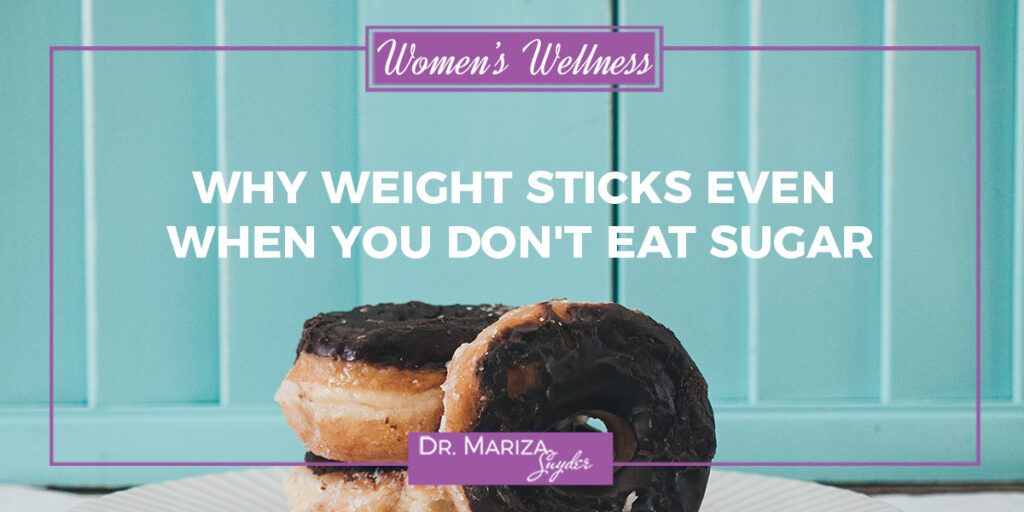
You do the work to cut out sugar (because we all know how bad it is for us), but despite your best efforts, the scale is NOT budging.
Your favorite jeans are still too snug.
You find yourself sucking it in whenever you pass a mirror.
And you feel so discouraged… Shouldn’t saying no to those cupcakes, ice cream, and Reese’s cups be paying off by now??
Before I go any further, I want you to know that you are on the right track. There is no good reason to eat sugar, and eliminating it is an amazing first step towards caring for your body as you deserve.
But the truth is that weight resistance happens to so many women and it can be caused by a lot of different factors (and even a combination of all of these!).
So whether you’re just starting your weight loss journey and you want to be prepared, or if you are feeling like you’re in over your head and still not making any progress, today I hope to help you troubleshoot some of the things that could be happening in your body.
Here are 8 questions to ask yourself when you feel stumped by your stubborn weight:
#1: Are you actually not eating sugar?
I know how hard it can be to avoid it… just grab any package Item at the grocery store and it’s pretty much guaranteed that sugar is in it.
Sugar is insidious like that: Just because you don’t see “sugar” on the ingredient list when scanning a nutrition label does not guarantee the item is sugar-free or even sweetener-free.
Sugar goes by a whopping 56 different names!
While some of these names are more obvious, like brown and cane sugar, others are trickier to spot (e.g., Maltodextrin and dextrose).
Shockingly, over 68% of barcoded food products sold in the US contain added sweeteners—even if they are labeled as “natural” or “healthy.”
Beyond packaged foods, natural sugars are found in a ton of foods that we consume each day that could be throwing off your blood glucose levels without your knowledge. Foods like sweet potatoes, berries, coffee, yogurt, and wild rice are all “healthy” but depending on your body, they could be spiking your insulin levels and contributing to your stubborn weight.
What to do about it: Go back to the basics. Stick to quality protein sources, lots of leafy greens, and low-glycemic-index fruits. If this feels overwhelming, check out Part III of The Essential Oils Menopause Solution for a meal plan that sticks to these guidelines! These recipes are DELICIOUS (you won’t even miss what you’re not eating), and your body and hormones will thrive with these nourishing choices.
#2: Is your thyroid functioning as it should?
This is an important place to start because SO MANY women are struggling with low thyroid function (and a majority may not even know it).
A sluggish thyroid can 100% cause weight gain whether or not you are eating sugar.
It may come as a surprise that women often start having thyroid issues after age 40. Because this coincides with the onset of perimenopause, thyroid issues often go undiagnosed. Your thyroid is your metabolic gas pedal. If it’s not doing its job everything slows down: your digestion, metabolism, energy levels, and brain function, to name a few.
So much suffering in perimenopause and menopause could be eliminated if you find that you have a low-functioning thyroid! No, it’s not the root cause for everyone, but it’s common enough that I recommend everyone get a full thyroid panel if symptoms like stubborn weight, low energy, sleep problems, migraines, and period problems are making your life hard right now.
What to do about it: First, get a full thyroid panel (this is not what your doctor does automatically—but if you come in prepared and knowledgeable, ready to fight for what you know you need, you can get this test done just about anywhere). Once you find where the disconnect is, then you can take steps to start healing and supporting your thyroid naturally. (I’ve got LOTS of resources on that, check them out here!)
#3: How’s your stress level?
Your stress and your weight are intricately connected.
Stress often drives us to binge on ice cream or late-night chocolate (which definitely does nothing to help us the moment it’s done).
Our constant go-go-go lifestyles create a hormone cascade that causes fat to cling around the midsection instead of using it as fuel for energy. One of the primary culprits here is cortisol.
It has many roles in the body from helping you to wake up to regulating insulin, but its biggest role in mitigating and responding to stress.
Cortisol also triggers insulin in your body as a survival mechanism—meaning that being stressed has the same effect on your body as eating a cupcake (without actually getting to enjoy it).
You can diet and exercise and do everything right, but if your stress is still out of control, the weight will continue to cling to your middle.
Add to this elevated stress the hormone fluctuations of perimenopause and menopause (where insulin resistance is even more common and changing estrogen levels impact where fat deposits on your body), and it’s a recipe for the stubborn weight that can feel like it’s impossible to avoid.
Fortunately—it’s not! You CAN still feel energized and slim, shedding stubborn weight at any age. I outline more about this in The Essential Oils Menopause Solution and the bonus resources and chapters you get when you buy it now! >>
What to do about it: Just saying “feel less stressed” is pointless, given the crazy world we’re living in and the constant demands you have on your time. Instead, it’s about learning to reorient your priorities so your physical and mental health is in their rightful place—FIRST. One of my favorite tools for this is the Daily Self-Care Journal. In only 5 minutes in the morning, I set myself up for all-day success by setting powerful goals and intentions, developing daily gratitude practices, and reminding myself every single day that I deserve peace and energy. Get it here today! >>
#4: Are your hunger-signaling hormones out of alignment?
Leptin and ghrelin are two complementary hunger-signaling hormones that can easily get thrown off if you have even just a few extra pounds you’re trying to lose.
Leptin is produced by your fat cells, and it sends signals to your brain that you’ve got enough fuel stored so you don’t need to eat more. This makes you feel satiated and reduces your appetite.
However, people who have extra weight who do have high levels of leptin become resistant to its messages. Basically, leptin sends messages to your brain over and over saying “We’re full! No need to eat more.” But then your brain deletes the message without reading it and doesn’t respond. This leads to overeating, always feeling hungry, and—you guessed it—extra weight.
Ghrelin is its counterpart that signals hunger. When your stomach is empty, it releases ghrelin which tells your hypothalamus it’s time to fuel up again.
Typically, ghrelin levels are elevated before you eat and lowest after a meal. However, it can also become deregulated by excess weight or sluggish metabolism, breaking the signal path your body relies on for true hunger and true satiety.
If this sounds like a vicious cycle, it is. You have stubborn weight that you’re trying to shed, yet the weight itself could be blocking these signals by disrupting the communication patterns with your brain. This is so frustrating, but you can rebalance these hormones!
What to do about it: Fueling your body with protein, fat, and fiber is a proven effective way to help get these messages evened out. Omega-3 fatty acid supplements or high-quality fats in your diet (like fish, olive oil, and avocados) are a great tool to improve your feelings of satiety by improving leptin sensitivity. (1) Getting enough protein and fiber—especially at breakfast—will reduce ghrelin so you’re feeling more satisfied all day long. (2) This is one of the reasons I start every day with a green smoothie. Not only does it improve gut health and supply key nutrients for my body, but it works to balance ghrelin and leptin to help me stay satisfied longer! Check out this post for some expert tips for smoothie success. 😉
#5: Are you eating too often?
In America, most of us live in a culture where food is overabundant. We are over-indulging our bodies, and our cells just haven’t evolved to the point of being able to keep up.
Snacking is not healthy. One of the biggest “nutrition” myths that are still so pervasive is that eating multiple smaller, frequent meals throughout the day boosts your metabolism or reduces your hunger, thereby controlling your weight.
For most of us—especially women over 40—this just isn’t true.
This frequent snacking actually causes your metabolism to slow down, and you aren’t able to fully harness all the energy and nutrition from the food you eat because the cycle restarts every time you put something in your mouth. It also consistently raises your insulin levels and can be a major contributor to insulin resistance—a major issue for women dealing with weight struggles (read more here).
What you can do about it: I recommend focusing on 2-3 nutrient-dense meals per day with no snacks in between. A green smoothie with protein and fiber is usually how I break my fast, then if I need it I’ll make a salad for lunch (with grilled chicken or salmon for protein), then a dinner built around vegetables, also with a good protein included.
Intermittent fasting can be highly effective for weight loss, especially for women over 40. Here’s what I suggest: choose 4-5 days per week to fast, leaving ideally 13-15 hours between dinner and breakfast where you take in nothing but water. This gives your body a break, allows your metabolism to reset, and your body to live off of some of the fat you’re storing!
#6: Are you moving your body enough and in the right ways?
Muscle health is a primary indicator of longevity for women. As we get to age 40, 50, and beyond, protecting your strength and muscle mass is critical for insulin regulation, burning fat, and long-term health.
If you are killing it at the gym 5, 6, or even 7 days a week, yet the scale isn’t budging, you may be stressing out your body, causing it to go into survival mode and cling to that fat for dear life because it feels threatened.
Alternatively, if you are sedentary, your muscles will not be in good enough shape to regulate your insulin and metabolism effectively as you get older.
What you can do about it: Instead of focusing only on high-intensity cardio workouts (which are still ok in moderation if they feel good for you in your unique body), I recommend shorter bouts of targeted strength training throughout your week. Even 20 minutes is enough to raise your metabolic rate for 2 hours following the workout! I like to build 20-minute intervals of gentle strength training into several times of my daily schedule.
As an added bonus, if you do this workout in the morning (when your cortisol is naturally highest), you’ll boost your mitochondrial health to give you more energy all day, and you’ll burn extra calories!
Beyond these “scheduled” or planned workouts, just increasing the amount of movement you do in your daily life will have an even greater effect on your metabolic flexibility moving forward.
Take the stairs, choose a further parking spot, pace while you talk on the phone… These things add up to burn more calories and increase your metabolism throughout your day!
#7: How are you sleeping?
I know, this isn’t a fun question. Reliving those restless nights where you wonder if your brain will ever shut off, or where you wake multiple times a night and find yourself more tired in the morning than when you went to bed is not pleasant.
But sleep is SO important—especially when it comes to your weight.
Sleep is where the magic happens. It’s when your metabolism reboots. It’s when your cells do the dirty work of clearing out junk that clogs them up and slows them down. It’s when your brain processes the stress and trauma of your day-to-day life. And a lack of sleep plays a big part in disrupting the leptin and ghrelin balance I was talking about above.
In short: if you’re not sleeping well, weight is going to be so much harder to lose.
What you can do about it: I know how frustrating it is to deal with sleep struggles. Insomnia, restlessness, and all-day exhaustion are no joke. Check out this post for some of my favorite sleep-support tips to get you resting and recharging well again!
#8: Are you deficient in key nutrients that your cells need for metabolism?
Last but definitely not least, nutrient deficiencies can absolutely contribute to a struggle to lose weight.
Just not eating sugar or other inflammatory foods isn’t enough—you NEED to supply your body with critical nutrients it needs to support your hormones, energy, and systems.
What you can do about it: You can bend over backward trying to get all the nutrients through food alone, but the reality is that if you have any sort of inflammation in your body, you won’t even be able to absorb some nutrients from your food. Supplements are the easiest and fastest way to make sure your body has what it needs for metabolism, energy, and hormone health—and weight loss by extension.
Here’s what I recommend for women who feel like their metabolism is lagging and have a few extra pounds to lose:
- Magnesium is critical for metabolism, energy production, muscle health, sleep, and so many other vital systems in your body—and almost all of us are deficient at some level. Get my recommended form here >>
- B Vitamins are important for energy production, liver health, and activation of your metabolic processes within your cells. Just make sure they’re methylated or activated, so they’re actually helpful for your body. Here’s what I recommend daily >>
- Vitamin C is a crucial antioxidant to alleviate inflammation in your cells and optimize liver health so you cycle out the excess hormones or toxins that are slowing down your metabolism in the first place. Instead of horse-pill vitamin C supplements, I recommend my Vitamin C Boost powder! Its natural citrus flavor is delicious in water infusions or daily smoothies to effortlessly up your intake daily. Get it here today >>
- Metabolic Restore contains vital minerals that your body needs for metabolism, as well as powerful adaptogenic herbs that balance blood sugar to get your body back on track. Get it here bundled with Pure Daily Fiber (also crucial for metabolism and weight loss) for 15% off today! >>
Get an All-Inclusive Plan to Reboot Metabolism, Shed Stubborn Weight, and Improve Your Energy Levels at Any Age!
The Essential Oils Menopause Solution provides a holistic approach to healing your body, reducing your biggest symptoms, and—yes—losing weight.
Each chapter will walk you through what you need to do to address your biggest symptoms, then part III is an incredibly valuable transformational plan to reset your gut, liver, and metabolism from home.
The supplement protocols, diet plans, and lifestyle recommendations give you what you won’t ever find at your doctor’s office: a personalized plan to heal YOUR biggest concerns, safely and naturally!
Grab your copy and over $500 in amazing bonuses today! >>
Order The Essential Oils Menopause Solution and Get Over $500 in Bonuses
Reference:
1. https://pubmed.ncbi.nlm.nih.gov/26829184/
2. https://pubmed.ncbi.nlm.nih.gov/21406307/


No comments yet.